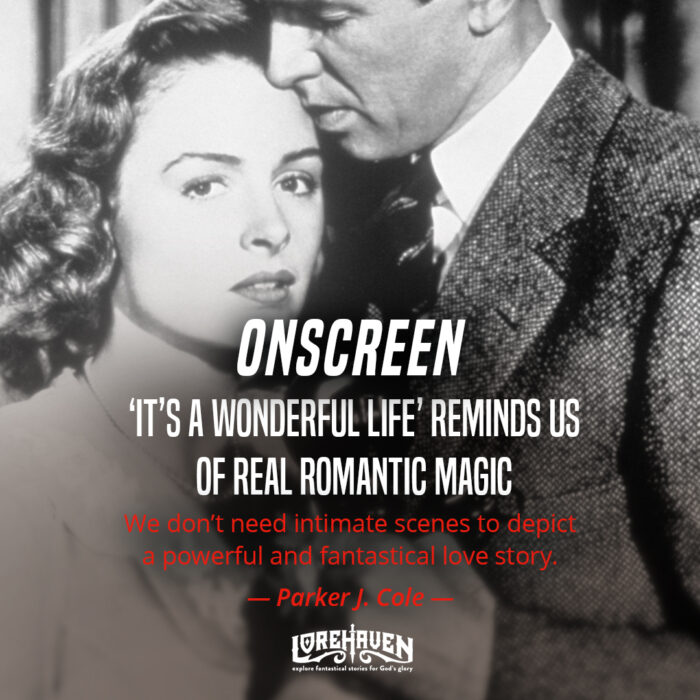‘It’s a Wonderful Life’ Reminds Us of Real Romantic Magic
One fall episode on the Chicken Shop Date YouTube channel matched show host Amelia Dimoldenberg with actor Andrew Garfield. The premise is simple. Amelia eats at a chicken restaurant and interviews celebrity guests with her brand of humor.
On this episode, however, it appeared as though Andrew genuinely wanted to take Amelia on a date. Commentators felt the “chemistry” between these two was of epic proportions.
I have to tell you, I’ve seen more sparks between a pair of socks with static cling.
A recent article came to the same conclusion. It further argued that people are longing for intimacy—so much so that even a hint of chemistry, real or staged, feels like a feast after starving for a long while. The author links this to the decline of intimacy and sex scenes in films. But is this really the case?
Let’s define on-screen chemistry as the actors’ ability to form a connection so real that it draws us, the audience, into the story, making us feel every emotion on the screen. For a lesson in onscreen chemistry, we need to take a page from one of the best movies of all time. Nearly eighty years later, it still captures the heart of millions.
It’s a Wonderful Life (1946),1 gives us a story of complexity, nuance, and a broader message about how each person’s life matters. George Bailey (played by James Stewart) is conflicted between his desire for exploration and his love for Mary Hatch (played by Donna Reed). And when he finally makes his decision, one of the best romantic kisses in cinema provides a wonderful tableau of powerful yet chaste romantic chemistry.
After an argument, a mutual friend calls to speak with Mary and George, and they share the phone. As the friends talk, the scene is wrought with friction, George and Mary are standing close. They’re overwhelmed by each other’s presence and trying to act normal when everything between them is anything but. Their awkwardness isn’t as stilted and unreliable as we see in the Amelia/Andrew interview. It’s relatable and human.
George can barely answer his friend’s questions while Mary stands by nervous and a bit afraid. You can feel the tension as they both try to ignore this thing sparking between them. George feels acutely aware of her and she of him. They sway to each other and then George explodes. He grabs Mary by the arms and tells her that he wants to live his life as he wants to … but then, in an almost-violent release, he brings her close and rains passionate kisses all over her face while saying her name repeatedly, succumbing to the fact that she means more to him than his ambitions.
All George and Mary do is kiss, and yet the scene scorches with chemistry.
Chemistry, that phenomenon that sparks and flares between two people connected by love, is an essential part of a romantic relationship. What makes the interview with Amelia/Andrew different is that people didn’t really know what they were seeing. It’s noteworthy that there’s something there and for my part, I wouldn’t mind seeing either of them succumb in the same way that George and Mary did.
Maybe the question isn’t if we suffer from a lack of intimacy, but from a lack of romance. God created sex, but he also created romance. The wooing and receiving. He created these chemical reactions and these soul touches we have with each other. Too often we perceive the end goal as sex, when the end goal is really marriage.
Perhaps what we need more of is examples of this. After the phone kiss in It’s a Wonderful Life, the next scene shows us that George and Mary have married, only hinting at the further intimacy that’s developed. The magic lies in what’s not said, in the moments that suggest rather than show.
The drought isn’t onscreen chemistry—it’s real-life connection. People yearn for the closeness committed relationships can provide. The best way to do that is to rediscover the value of real-life intimacy. Not in the quantity of sex scenes on screen, but in the manner of the bonds we build together.
- Editor’s note: Yes, over here at Lorehaven, we do count It’s a Wonderful Life as a fantastical story, even if it’s not normally discussed as a fantasy film. ↩





























I love romance done well, seeing that genuine connection between a man and a woman who have something special. I’m afraid that if in the cinema there is little sex in romantic or fantasy novels with romance, the called romantasy there is TOO MUCH SEX, people confuse the fact that two people have lustful thoughts all the time with chemistry or that they hate each other and do nothing but fight!
Chemistry is difficult to achieve as a lover of anime, manga and webtoons, I have seen couples there too that don’t give me any emotion at all…it’s more “this is the girl and this is the boy who is crazy about her”.